How Much Time Do People Really Spend on Screens?
October 23, 2024A Closer Look at 2024 Election Preferences by Demographic
November 4, 2024Top Voter Priorities: Economy vs. Social Issues in the Upcoming Election
In this election cycle, respondents ranked eight key issues to determine their top priorities. They were asked to rank each category based on importance, and the resulting data provides insights into which topics resonate most across demographic lines. The percentages below represent the respondents who placed each issue as either one of their top two priorities or one of their bottom two. Notably, the economy and inflation emerged as significant concerns across all groups, while other issues show varying levels of priority among different demographics. This breakdown highlights how economic and social issues weigh on people’s minds as they prepare for the upcoming election.
General
Economic concerns lead as the top priority, with 57% of respondents ranking the economy and 53% ranking inflation in their top two issues. Social topics, such as in vitro fertilization (IVF) and LGBTQIA+ rights, are more commonly positioned as lower priorities, with 49% and 58% of respondents, respectively, placing these in their bottom two. Other issues, including foreign policy, gun rights, immigration, and abortion, show more middle-ground ranking across the sample, highlighting a widespread prioritization of economic stability over social concerns.
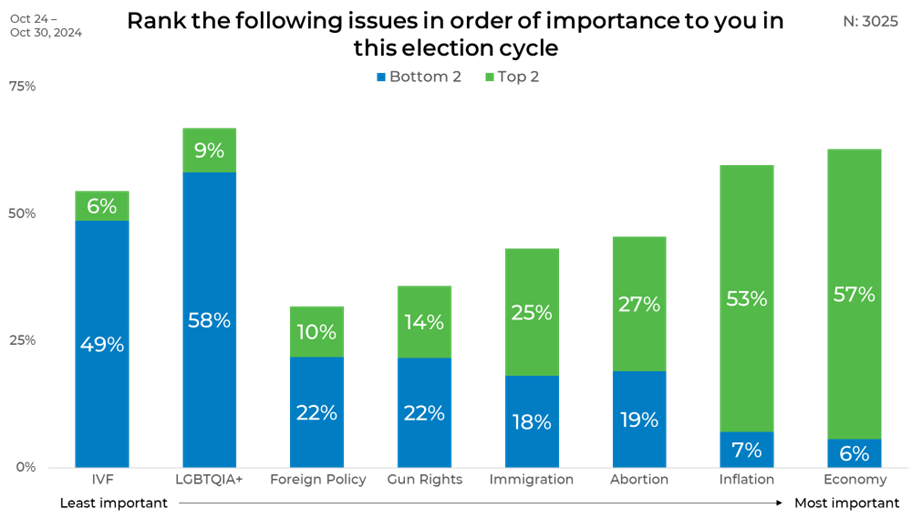
Gender
Both men and women share a focus on economic issues, with 56% of men and 57% of women ranking the economy among their top concerns, followed closely by inflation, prioritized by 51% of men and 54% of women. Notable differences arise in social concerns, with 31% of women placing abortion as a top priority, compared to 20% of men, while 30% of men consider immigration a leading issue, contrasted with 22% of women. Other topics like LGBTQIA+ rights, IVF, and gun rights show minor gender-based differences and remain lower in importance across both groups.
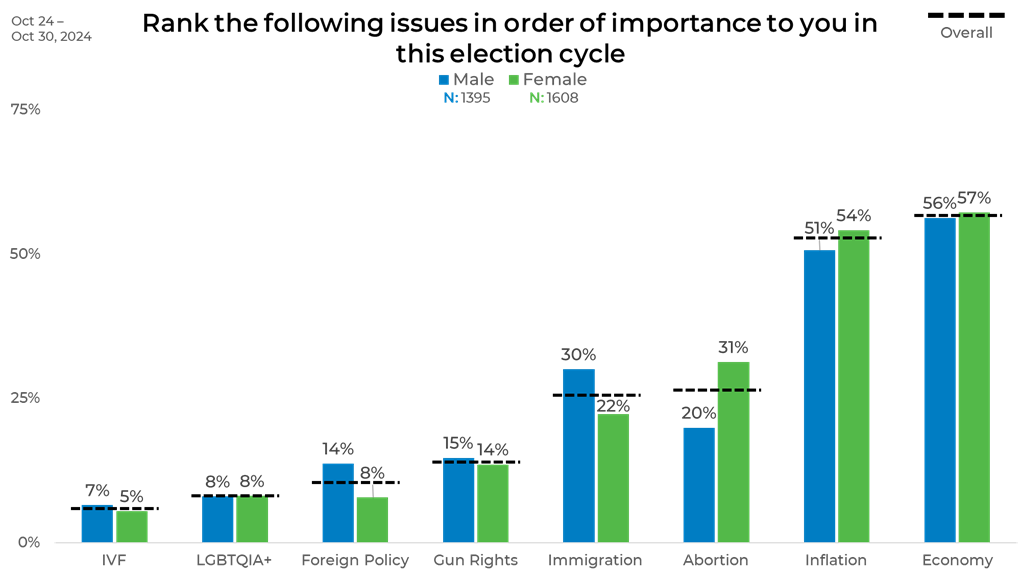
Political Affiliation
Differences in prioritization emerge across political lines, particularly on social and economic issues. Republicans and Independents prioritize the economy and inflation, with 62% of Republicans and 60% of Independents ranking the economy as a top issue, followed closely by inflation at 59% and 58%. Democrats, though concerned with economic stability, place a slightly lower emphasis, with 52% on the economy and 47% on inflation. Social issues like abortion and LGBTQIA+ rights show the greatest partisan divide, with 41% of Democrats focusing on abortion, compared to 12% of Republicans. Immigration ranks notably higher among Republicans (40%) than Democrats (13%).
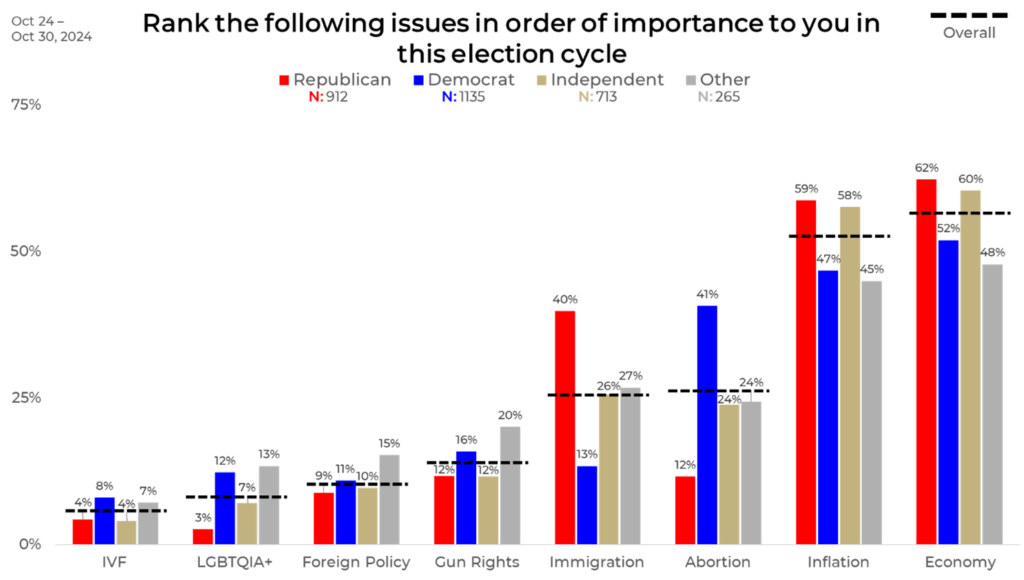
Age
Generational divides appear in issue prioritization, particularly between economic and social topics. The economy and inflation remain crucial across all age groups, with the highest emphasis on inflation among those aged 45-64 (60%) and on the economy among the 35-44 age group (60%). Immigration ranks significantly higher for older respondents (37% among those 65+) than among younger individuals. Conversely, younger respondents prioritize social issues, with LGBTQIA+ rights a top concern for 18% of the 18-24 group, and IVF also gaining attention among the 25-34 group (10%). These trends reflect a generational split, with older voters emphasizing economic and immigration issues, while younger voters show higher interest in social matters.
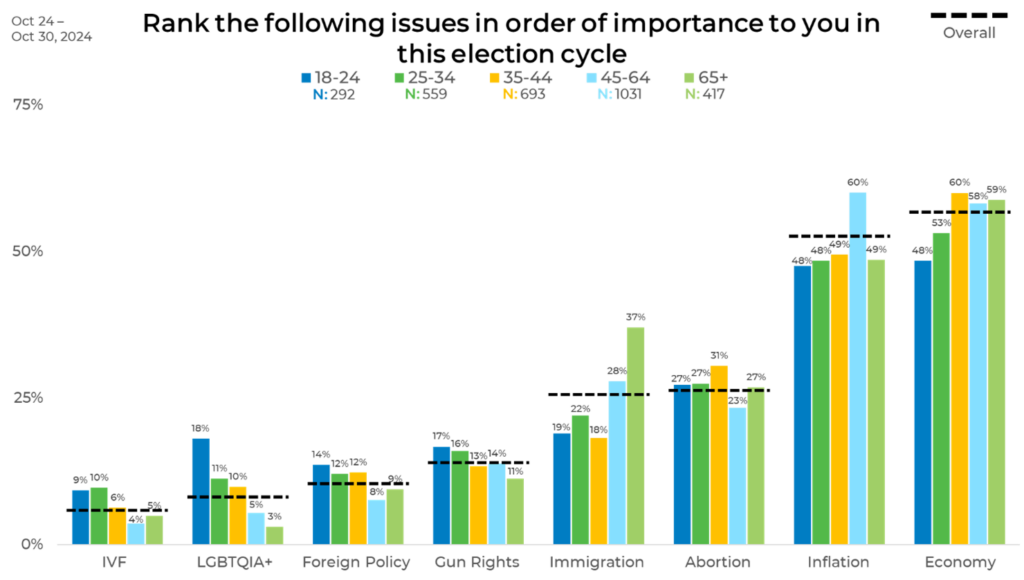
Ethnicity
Economic issues dominate as top priorities across ethnic groups, with Hispanic/Latino respondents ranking the economy highest (59%), followed by inflation at 56%. Other groups, including Caucasian, African-American, and Asian respondents, align closely on economic priorities, though with slight variations. Social issues, however, reveal more nuanced preferences, with abortion prioritized more by African-American respondents (32%) than other groups. Gun rights rank higher among African-American (19%) and Asian (18%) respondents than among Caucasians (12%). Immigration emerges as a notable concern for Caucasian (28%) and Hispanic/Latino (25%) respondents, underscoring diverse priorities within social policy discussions across ethnic lines.
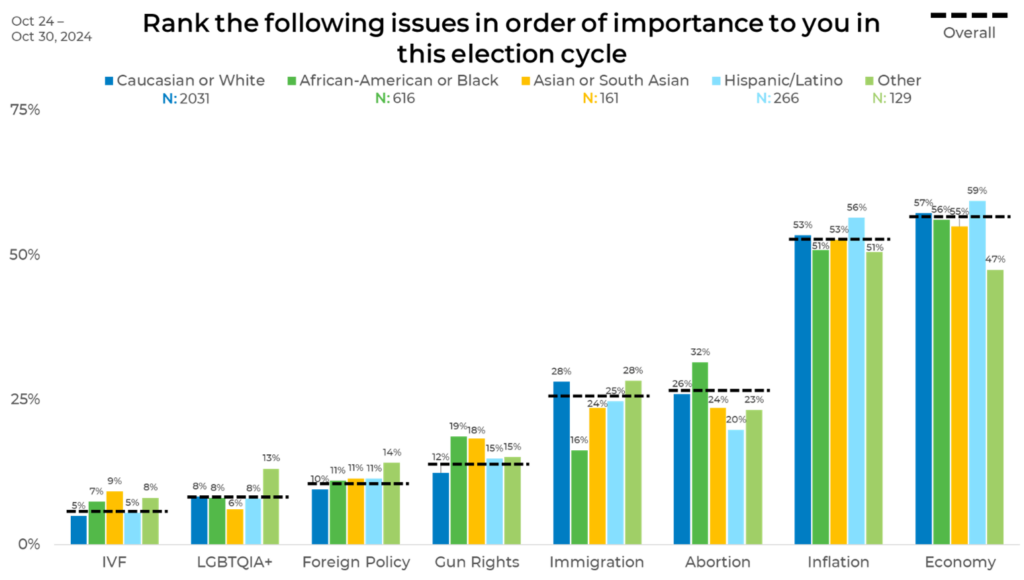
Panels
Economic issues are consistently the focus across all panels, with the economy and inflation consistently ranking as top concerns. Panel P exhibits the highest focus on the economy (66%), while Panel D shows lower but still significant prioritization at 48%. Inflation peaks at 56% for Panel H, showing strong consensus across panels. Social issues vary more noticeably by panel, with immigration prioritized most by Panel D (34%) and least by Panel P (21%). IVF and LGBTQIA+ rights show similar variation, with higher prioritization among specific panels like Panel B (8% for IVF, 13% for LGBTQIA+ rights) compared to others. This data emphasizes a shared concern for economic stability across panels while indicating distinct preferences for specific social issues within different groups.
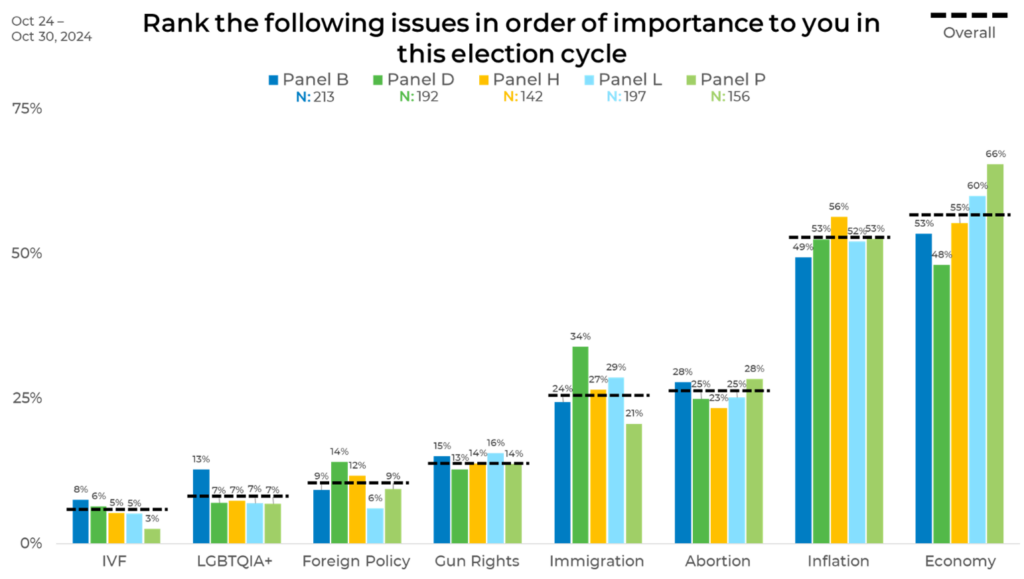
This panel breakdown is an excellent representation of where quality data sampling matters. Panel B differs from Panel H and if you only had the insights from one, your data would be skewed. Thats why at EMI, we prioritize strategically blending sample sources to balance demographics as well as behaviors and attitudes to ensure that we provide the most representative and accurate data. Download The Sample Landscape: 2024 Edition to better understand how panels differ from one another and how they impact your data.



